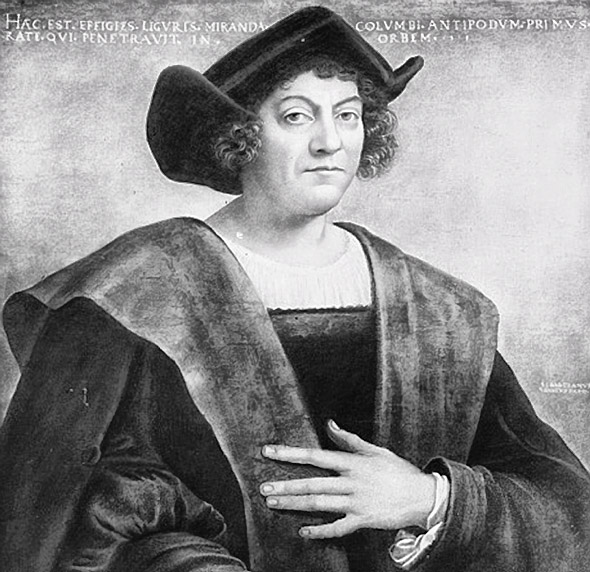… but when?
So it’s Columbus Day here in the United States, a federal holiday that means the banks are closed and the mail won’t be delivered.
It was included in the list of to-be-celebrated-on-a-Monday holidays in 1968.1

But since The Legal Genealogist is off making the most of the holiday,2 and since I couldn’t find the answer easily or quickly online, here’s a test for this blog’s faithful readers:
When did Columbus Day first become an official federal holiday?
Some online sources say it was first made a federal holiday by Franklin Delano Roosevelt by presidential proclamation in 1937.3 Others say it was by FDR and by presidential proclamation, but it was in 1934.4 None of ’em cite their sources.
So… when did Columbus Day first become a federal holiday?
And yeah… cite your sources.
SOURCES
Image: Christopher Columbus, photograph of a painting, c1908, Detroit Publishing Company, Library of Congress Prints & Photographs Division.
- “An Act To provide for uniform annual observances of certain legal public holidays on Mondays, and for other purposes,” 82 Stat. 250 (28 June 1968). ↩
- My family had a get-together in Puerto Penasco, Mexico, and we’re all headed home today. ↩
- See e.g. “Columbus Day 2018,” This Day in History, History.com (https://www.history.com/ : accessed 8 Oct 2018). ↩
- See e.g. “Columbus Day,” Today in History – October 12, Library of Congress (https://www.loc.gov/ : accessed 8 Oct 2018). ↩



The first National Columbus Day was instituted by President Franklin D. Roosevelt by proclamation on 18 September 1937; however, the 73rd Congress approved a public resolution allowing the President to issue the proclamation on 30 April 1934.
Marc O. DeGirolami, “FDR”s 1937 Columbus Day Proclamation,” Law and Religion Forum (https://lawandreligionforum.org/2017/10/09/fdrs-1937-columbus-day-proclamation/ | accessed 8 October 2018.)
Proclamation 2253, “FDR Proclamations, 1937,” LegisWorks (http://legisworks.org/congress/75/proc-2253.pdf | accessed 8 October 2018.)
Well done! Except, of course, for the 1934 statutory cite… (Not that I’m being demanding or anything… 🙂 )
If the question is based on “an official federal holiday,” then I disagree that a Presidential Proclamation is enough. My answer is 1968.
Jacob R. Straus, Federal Holidays: Evolution and Current Practices, CRS Report No R41990 (Washington, DC: Congressional Research Service, 2014), (https://fas.org/sgp/crs/misc/R41990.pdf | accessed 8 October 2018)
Sounds like we may need to address the question of defining terms!
And they just kept proclaiming! http://www.presidency.ucsb.edu/ws/index.php?pid=6706
Does cite 1934 as original. That is the Italian American Congressional delegation behind Carter.
They certainly did, but we need to track down the source of the source.
OK Here you go. With sources.
I searched the internet and found the American Presidency Project at UC Santa Barbara. The project website has a list/database of all the Presidential Proclamations from Washington to Trump. I could find no proclamation from FDR about Columbus Day on that website in any of his years in office. I continued to search and discovered that President Truman issued Proclamation 2665, entitled “Columbus Day, 1945,” on 28 Sep 1945. The proclamation states “Whereas Public Resolution 21, Seventy-third Congress, approved April 30, 1934, provides: That the President of the United States is authorized and requested to issue a proclamation designating October 12 of each year as Columbus Day and calling upon officials of the Government to display the flag of the United States on all Government buildings on said date and inviting the people of the United States to observe the day in schools and churches, or other suitable places, with appropriate ceremonies expressive of the public sentiment befitting the anniversary of the discovery of America.” So Truman issued a proclamation.(1)
However, Truman’s proclamation and all the later ones submitted by successive Presidents did not designate Columbus Day as a legal federal holiday planned for each year as we know it today. More searching on the internet. Later Presidential Proclamations reference an act of Congress, Public Law 90-363, 82 Stat. 250, H.R. 15951, enacted June 28, 1968, which provides “for uniform annual observances of certain legal public holidays on Mondays, and for other purposes.” This statue include Columbus Day on the second Monday in October and took effect January 1, 1971.(2)
Oops! Someone must have realized that the original statute from Congress stated that Columbus Day should be October 12 and had never been revised to reflect the PL from 1968. So in 1998 Congress revised the 1934 statue to designate the second Monday in October as Columbus Day.(3)
Whew! I “wasted” an hour on this, Judy. Thank you.
Presidential Proclamation 2665, Gerhard Peters and John T. Woolley, “The American Presidency Project,” http://www.presidency.ucsb.edu/proclamations.php?year=1945&Submit=DISPLAY [accessed 8 Oct 2018]
Public Law 90-363, 82 Stat. 250, H.R. 15951, June 28, 1968, https://www.gpo.gov/fdsys/pkg/STATUTE-82/pdf/STATUTE-82-Pg250-3.pdf [accessed 8 Oct 2018]
Public Law 105–225, 112 Stat. 1256, August 12, 1998, https://www.gpo.gov/fdsys/pkg/USCODE-2011-title36/html/USCODE-2011-title36-subtitleI-partA-chap1-sec107.htm [accessed 8 Oct 2018]
See Sarasota The Herald Tribune, Saturday, June 29, 1968 page 9.
LBJ signs Bill to Set up Five 3-day Weekends
https://news.google.com/newspapers?id=9eYhAAAAIBAJ&sjid=5GUEAAAAIBAJ&pg=6061,7091289&dq=district+of+columbia&hl=en
… “Although the law applies directly only to employees of the federal government and the District of Columbia, the states are expected to follow suit…
…One of the Monday holidays is a brand new one, on a national scale. This is Columbus day to honor the Italian explorer and it will fall on the second Monday in October. “
See also: http://www.presidency.ucsb.edu/ws/?pid=28963
342 – Statement by the President Upon Signing the Uniform Holiday Bill. June 28, 1968
Note: As enacted, the bill (H.R. 15951) is Public Law 90-363 (82 Stat. 250).
For Public Law 90-363 see:
https://www.gpo.gov/fdsys/pkg/STATUTE-82/pdf/STATUTE-82-Pg250-3.pdf